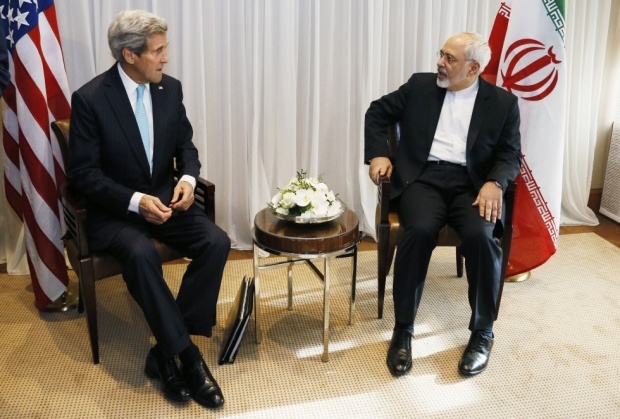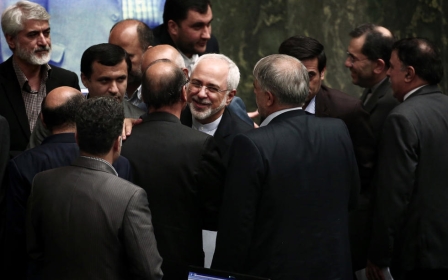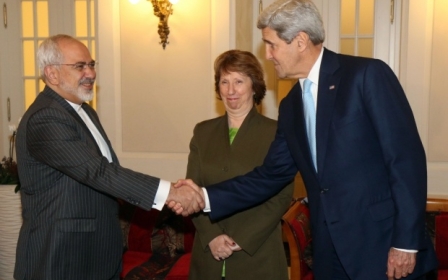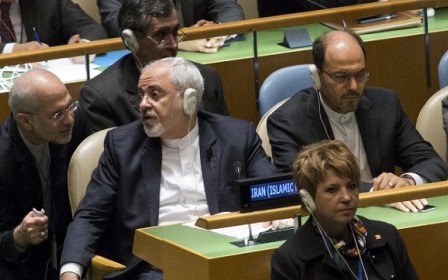ANALYSIS: Political heckling gone too far in Iran

On 21 October, Supreme Leader Ayatollah Ali Khamenei drafted a letter, approving the Iranian government’s nuclear deal with world powers, ending tense debates in Tehran which climaxed with barefaced threats and curses against Foreign Minister Mohammad Javad Zarif.
Following the letter’s publication, Khamenei’s site published a picture of the Supreme Leader that read: “Conditional Welcome”.
Indeed, the Supreme Leader’s letter was a conditional approval, because he did present a number of provisions, including that Tehran should not forfeit core elements in its atomic programme until allegations of past military dimensions had been settled.
The letter sought to appease both hard-liners and President Hassan Rouhani’s supporters. Khamenei gave the green light to Rouhani to implement the deal, while in the same breath cited weaknesses in the deal, which he warned “might harm the country, if not carefully heeded”.
Hardline newspapers Kayhan and Vatan Emrooz’s top stories were respectively headlined: “The Leader thwarted America’s plan” and “Antidote”. Moderates and reformist newspapers welcomed Khamenei's letter, describing it as “the conditional approval”.
On 22 October, Rouhani replied to the Supreme Leader’s letter. He expressed gratitude to Khamenei for his guidelines and support regarding the agreement, and reiterated that the Leader’s instructions would be carefully considered.
Following Rouhani’s answer, Ali-Reza Zakani, a staunch opponent of the nuclear deal, appeared on Iran’s state TV, saying: “Critics and supporters of the deal should move forward and help the government as it strives to implement the deal based on the 28 points cited by the Supreme Leader, parliament and the National Supreme Security Council.”
On 23 October, Tehran’s conservative Friday Prayer Leader, Ahmad Khatami, said: “The historic letter of the Supreme Leader closed the nuclear deal case.”
He added: “The debates over the Joint Comprehensive Plan of Action (JCPOA) are over, because the deal has become law.”
Hardliners protest that Iran’s negotiators granted too many concessions and now express concerns regarding “possible infiltration of the US in Iran”.
Moderates and reformists, on the other hand, believe that the hardliners are actually worried about the consequences of the nuclear deal on people’s votes in the parliamentary and presidential elections, and that the progression of events will work in favour of the moderates when it comes time to vote.
Political activist Darush Qanbari told MEE: “Hardliners are anxious about their political future, because now that we have come to an agreement, they will become more isolated. Most people are in favour of the deal, and they recognise who is throwing obstacles in the way of the JCPOA’s passing in parliament. Hardliners know that their chances for victory in the coming parliamentary election have decreased significantly.”
Payback
Seemingly, hardliners who have lost the game to Rouhani’s government are seeking reprisal from the man who played a key role in promoting the nuclear deal.
“The attacks against Zarif are coming from the hardliners. They have no ... approval of the people. They assume that they can win votes for the next parliamentary election by cursing. But this is wrong, because they have lost the trust of the people.”
He continued: “Everything the hardliners have done to undermine Zarif and President Rouhani has backfired; their actions have further isolated them from the people.”
Following the historic restoration of the Iran-US relationship, and especially after the handshake between Zarif and US President Barack Obama, Iranian hardliners raged against Zarif.
The infamous handshake occurred on the sidelines of United Nation General Assembly. Nozar Shafie, the spokesperson for the foreign policy committee of Iran’s parliament, quoted Zarif as telling MPs of his encounter with Obama: “Normally, heads of state leave the UN after delivering their speech, and Obama also left the building that day, but it seems that he had planned to shake hands with President Rouhani, not me. Thus, my encounter with the US president was accidental. What I did was based on Islamic ethics, because Obama walked towards me and stretched out his hand. Overall, the meeting lasted one minute.”
“Obama told me that too much effort had been invested to reach the nuclear deal, and we should be industrious in implementing it.”
Moments after the news leak, Iran’s foreign ministry released a statement, emphasising that Obama and Zarif ran into each other coincidentally. It seems that Zarif knew full well harsh attacks were awaiting him at home.
The day after the handshake, hardliners voiced their anger at Zarif one by one. Mansur Haghighat Pour, a hardline MP, described Zarif’s actions following his encounter with Obama as “inappropriate,” saying: “Shaking hands with Obama and Kerry wasn’t a good act, and Zarif owes the Iranian nation an apology.”
Ataollah Hakimi, another hardline MP, said: “Why should we shake hands with our enemy? What Zarif did wasn’t in the interests of Iran.”
The pressures built up to the point that some MPs asked for the impeachment of the foreign minister, who has become a national and international icon for achieving the nuclear deal, which will put a stop to sanctions.
MP Esmaiel Kowsari said: “Considering Zarif’s unrevolutionary act, MPs are seeking to impeach him, and I agree with that.”
Attempts at defaming Zarif were met with rebuttals from moderate and reformist parties. Ali Motahari, a prominent moderate MP, said: “We should question this MP (Biravand) who disrespected Zarif. Why do you address Zarif as unprejudiced, when the Supreme Leader has described him as reliable and pious?”
Zarif, who at time of the criticism was in the US, said: “Those who insult or slander me should be responsive before God.”
Explaining the roots of the attacks against Iran’s foreign minister, Saeed Leilaz, a reformist political activist, told MEE: “The attacks against Zarif is the product of the nuclear deal, however, the harsh rhetoric towards the foreign minister signals the heightening of tensions of political atmosphere of Iran, as well as the further isolation of hardliners.”
He added: “Hardliners are being isolated more and more by the government’s policies on foreign affairs’ issues, they are anxious about Rouhani’s power which is increasing.”
But Falahat Pisher, a former conservative MP, had a different take on the recent events, explaining: “The recent tensions wasn’t unusual, and I think it will have no lasting impact on Iran’s political scene.“
A social media campaign has commenced in Iran, spearheaded by activists and ordinary citizens who are appalled by the assault on Zarif. Several channels were created on the Telegram app, which has garnered immense popularity following Viber being banned in Iran. On a Telegram group named “Yes to Zarif and No to hardliners,” one user wrote: “Mr. Zarif, the ever-smiling face of the Iranian nation is strongly behind you.”
Death threats
Despite the efforts of supporters, the attacks haven't stopped. The came to a peak when hardline MP Rohollah Hosseinian threatened to execute Zarif and Salehi.
According to Iranian media, Hosseinian approached Zarif and Salehi’s chairs three times and gave them a death threat. He addressed the two, saying: “You want to take out the heart of Arak reactor and fill it with cement, be ready because I will put you in place of the reactor’s heart and bury you in cement.”
Zarif, who was stunned, satirically said: “I’m so pleased with your kindness.”
Salehi, who stood up to the MP and his threats, went on the tribune in parliament, complaining: “Today at the parliament, someone swore and told me that he would bury me in cement. What kind of talk is that?"
Hosseinian was slammed by liberal media for his outburst and threats, but he refused to express remorse and pressed that he was sincere in his threats. Hosseinian became the topic of conversation among all parties as well as the subject of limitless caricatures and jokes in the streets and in the media.
One particularly well-known caricature shows Zarif and Salehi, congratulating each other over the nuclear deal success, while they turn into concrete statues. When questioned by the Japanese foreign minister about the cast on his leg from a recent injury, Zarif joked, assuring the foreign minister, “It’s related to the past, and has nothing to do with cement.”
Hashtag campaigns on social networks including Instagram and Telegram were prolific: “Zarif is not alone”, “Thank you Zarif and Salehi” and “Supporting Zarif against cement” are among the many campaigns.
Younes Mohseni, an Iranian student studying architecture, told MEE: “Zarif and Salehi put all of their efforts into having the sanctions lifted and this will be recorded in Iran’s history forever. Hardliners are in no place to threaten these hardworking diplomats, and they should be shameful for their threats.”
A few days after returning to Iran from the United States, Zarif was interviewed by the foreign policy committee of the parliament. His explanation regarding the interaction with the US president didn’t satisfy some members of the committee. The issue, according to the parliament’s official website, will be further discussed in an open session of the parliament. No wonder Zarif continues to face a tumult of threats and heckling by hardliners.
New MEE newsletter: Jerusalem Dispatch
Sign up to get the latest insights and analysis on Israel-Palestine, alongside Turkey Unpacked and other MEE newsletters
Middle East Eye delivers independent and unrivalled coverage and analysis of the Middle East, North Africa and beyond. To learn more about republishing this content and the associated fees, please fill out this form. More about MEE can be found here.




